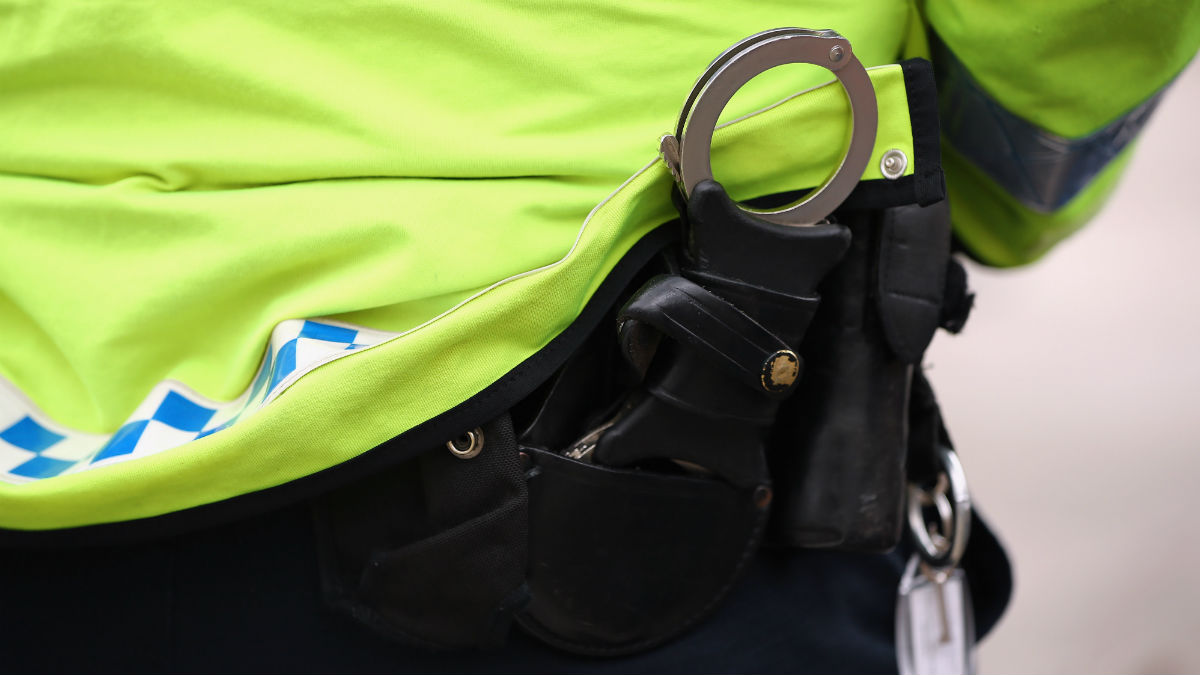Police put 11-year-old disabled girl in handcuffs and spit hood
Sussex Police also criticised for not allowing the child to see her mother while in custody

A free daily email with the biggest news stories of the day – and the best features from TheWeek.com
You are now subscribed
Your newsletter sign-up was successful
A police force has been condemned for placing a young disabled girl in handcuffs, leg restraints and a spit hood, following an investigation by the Independent Police Complaints Commission (IPCC).
The 11-year-old child, who has a neurological condition similar to autism that can trigger sudden bursts of anger, was detained by Sussex police on four separate occasions in 2012.
Known only as Child H, the girl was held in police custody for a number of minor offences for a total of 60 hours, during which she was unable to see her mother or a social worker.
The Week
Escape your echo chamber. Get the facts behind the news, plus analysis from multiple perspectives.

Sign up for The Week's Free Newsletters
From our morning news briefing to a weekly Good News Newsletter, get the best of The Week delivered directly to your inbox.
From our morning news briefing to a weekly Good News Newsletter, get the best of The Week delivered directly to your inbox.
"This is one of the most shocking examples of a disabled child being held in police custody, both because of her very young age and because of the length of time she was denied access to an appropriate adult," the family's solicitor Gus Silverman told The Guardian.
The girl's mother has described the ordeal as "nothing short of a nightmare" and is calling for an urgent ban on the use of spit hoods on disabled children and their detention in police cells.
"At the time her disability meant that she could behave in very challenging ways, but what she needed was patience, respect and the support of her mother," said the woman. "Instead she was locked up in a police station without me or anyone else who knew her for support."
The police watchdog has concluded that a number of officers and staff members have a case to answer for misconduct after failing to respond effectively to the needs of a vulnerable child. It also criticised the force for failing to ensure that an appropriate adult was present.
A free daily email with the biggest news stories of the day – and the best features from TheWeek.com
A number of recommendations were made by the IPCC, including improved training on the use of force on children and adults with mental illness.
The force's temporary deputy chief constable, Robin Smith, said Sussex Police welcomed the IPCC's scrutiny and has already adopted schemes designed to offer greater support to vulnerable people.
"As a chief officer I have a duty to protect officers and the public when we are called on for help, whether the threat comes from a child or someone who is unwell," he said.
"The application of any type of restraint is considered only when the level of resistance causes concern for the safety of the detained person, the officer and other members of the public."
-
 Antonia Romeo and Whitehall’s women problem
Antonia Romeo and Whitehall’s women problemThe Explainer Before her appointment as cabinet secretary, commentators said hostile briefings and vetting concerns were evidence of ‘sexist, misogynistic culture’ in No. 10
-
 Local elections 2026: where are they and who is expected to win?
Local elections 2026: where are they and who is expected to win?The Explainer Labour is braced for heavy losses and U-turn on postponing some council elections hasn’t helped the party’s prospects
-
 6 of the world’s most accessible destinations
6 of the world’s most accessible destinationsThe Week Recommends Experience all of Berlin, Singapore and Sydney
-
 Home Office worker accused of spiking mistress’s drink with abortion drug
Home Office worker accused of spiking mistress’s drink with abortion drugSpeed Read Darren Burke had failed to convince his girlfriend to terminate pregnancy
-
 In hock to Moscow: exploring Germany’s woeful energy policy
In hock to Moscow: exploring Germany’s woeful energy policySpeed Read Don’t expect Berlin to wean itself off Russian gas any time soon
-
 Were Covid restrictions dropped too soon?
Were Covid restrictions dropped too soon?Speed Read ‘Living with Covid’ is already proving problematic – just look at the travel chaos this week
-
 Inclusive Britain: a new strategy for tackling racism in the UK
Inclusive Britain: a new strategy for tackling racism in the UKSpeed Read Government has revealed action plan setting out 74 steps that ministers will take
-
 Sandy Hook families vs. Remington: a small victory over the gunmakers
Sandy Hook families vs. Remington: a small victory over the gunmakersSpeed Read Last week the families settled a lawsuit for $73m against the manufacturer
-
 Farmers vs. walkers: the battle over ‘Britain’s green and pleasant land’
Farmers vs. walkers: the battle over ‘Britain’s green and pleasant land’Speed Read Updated Countryside Code tells farmers: ‘be nice, say hello, share the space’
-
 Motherhood: why are we putting it off?
Motherhood: why are we putting it off?Speed Read Stats show around 50% of women in England and Wales now don’t have children by 30
-
 Anti-Semitism in America: a case of double standards?
Anti-Semitism in America: a case of double standards?Speed Read Officials were strikingly reluctant to link Texas synagogue attack to anti-Semitism